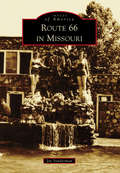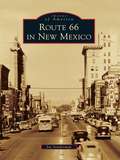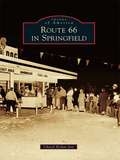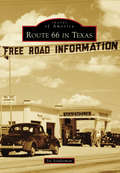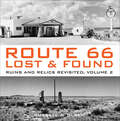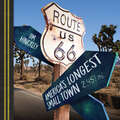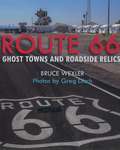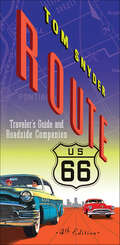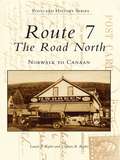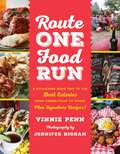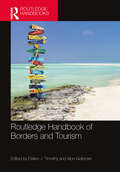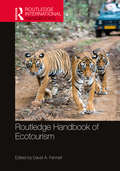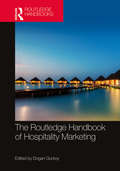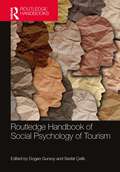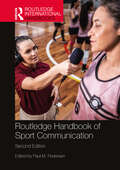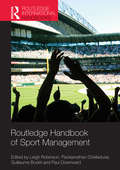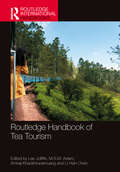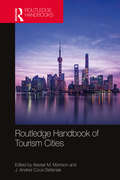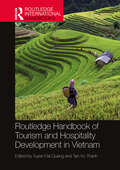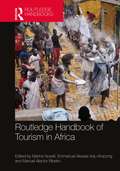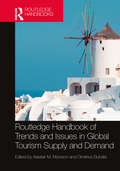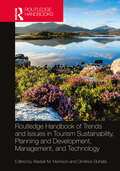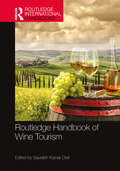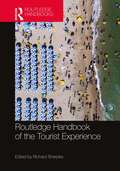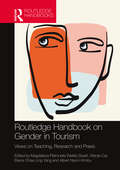- Table View
- List View
Route 66 in Missouri (Images of America)
by Joe SondermanRoute 66 is the "Main Street of America," heralded in song and popular culture. It took a maze of different routes through St. Louis before slashing diagonally across the "Show-Me State" through the beauty of the Ozarks. In between, there are classic motels, diners, tourist traps, and gas stations bathed in flashing and whirling neon lights. Natural wonders include crystal-clear streams, majestic bluffs, and wondrous caverns. Roadside marketers concocted legends about Jesse James, painted advertisements on barns, lived with deadly snakes, or offered curios such as pottery and handwoven baskets. That spirit is alive today at the Wagon Wheel and the Munger-Moss, the Mule, Meramec Caverns, and Ted Drewes Frozen Custard, just to name a few. Their stories are included here.
Route 66 in New Mexico
by Joe SondermanNew Mexico is "The Land of Enchantment," offering a fascinating blend of Native American, Spanish Colonial, and Western American cultures. The travelers from the East knew they had arrived in the great Southwest when they entered New Mexico--the towns along Route 66 were ablaze in neon, and the motels lured travelers with Western themes, Pueblo Revival architecture, and Native American trading posts. An adventure still awaits the traveler today who takes the time to exit I-40 and leave the franchised blandness behind. The neon still flickers at the Blue Swallow Motel in Tucumcari, on Central Avenue in Albuquerque, and at the El Rancho Hotel in Gallup. The "Fat Man" still smiles at Joseph's Bar and Grill in Santa Rosa. The stories behind those landmarks are here, as well as the stories behind establishments that are lost forever or slowly crumbling to dust among the tumbleweeds.
Route 66 in Springfield
by Cheryl JettFrom 1926 through 1977, Route 66 carried millions of travelers from the shores of Lake Michigan to the Pacific Coast. Americans fell in love with the automobile and made a family tradition of the road trip. On its three different alignments through the capital city of Springfield, Route 66 took motorists around the Illinois State Fairgrounds, past the state capitol, and through Abraham Lincoln's neighborhood. Mom-and-pop motels, gas stations, and eateries opened along the highway and became familiar landmarks to travelers in the "Land of Lincoln." In Springfield, the "horseshoe" and the "cozy dog" became popular local foods, and one of the first drive-up window restaurants opened. A man spent 40 years on Route 66 operating his gas station before transforming it into an internationally known museum. Meet the proprietors of these businesses, witness the growth of the highway, and enjoy a generous dose of nostalgia.
Route 66 in Texas
by Joe SondermanRoute 66 stretches across 178 miles and through seven counties in the Texas Panhandle. To a traveler on Interstate 40, the road may seem like an endless expanse, with the horizon interrupted only by the occasional grain elevator. But there is history, scenery, and adventure waiting on Route 66, which follows the trail of the Native Americans, conquistadors, cattle and oil barons, cowboys, and Dust Bowl refugees. With such sites as the blazing neon sign at Shamrock's U-Drop Inn and the quiet ruins of Glenrio, Route 66 in Texas is still "The Main Street of America." The traveler who leaves the franchised blandness of the interstate will see motels with Western and Native American imagery, good old-fashioned tourist traps, some bizarre sculptures (such as cars stuck in the ground at Cadillac Ranch), and beautiful Art Deco structures. These images and stories tell of mom-and-pop establishments that still thrive today and those that are crumbling in the swirling dust and tumbleweeds of the notorious Jericho Gap.
Route 66, Lost & Found: Ruins and Relics Revisited, Volume 2
by Russell A. Olsen“[The] text and photos make this . . . more than a pretty coffee-table book, Route 66 aficionados will want to add this descriptive tome to their collections.” —Ruidoso News (New Mexico)Much more than a ribbon of crumbling asphalt, Route 66 is a cultural icon revered the world over for its nostalgic value—an east-west artery pointing America toward all the promise that the great West represented. But as stretches of Steinbeck’s “Mother Road” were bypassed and fell into disuse, so too did most of the bustling establishments that had sprouted up from Illinois to California to cater to weary travelers and hopeful vacationers alike. Motor courts, cafes, main streets, filling stations, and greasy spoons—all are represented in this second volume of Lost & Found images from photographer Russell Olsen. As with its predecessor, Route 66 Lost & Found (2004), this new installment presents dozens of locations along Route 66’s entire 2,297 miles, showing them both as in their heydays in period photographs and postcards and as they appear today. Each site is accompanied by a capsule history tracing the locale’s rise and fall (and sometimes rebirth), as well as an exclusive map pointing out its location along Route 66.“Author Russell Olson has unearthed old photos and postcards of various buildings, landmarks and towns which he carefully researches and then rediscovers and takes pictures of them as they are today.” —Auto Aficionado “I could barely put this down.” —Daily Express (UK) “A good read for fans of roadside architecture.” —Classic and Sports Car (UK)
Route 66: America's Longest Small Town
by Jim HinckleyTake a road trip down the iconic &“Mother Road&”! Route 66 tells the stories of this highway's people, legends, and funky roadside attractions. Part legend, part nostalgia, part working highway, part touchstone to an America of the past, Route 66 is the only road in the United States so fascinating that both Americans and international visitors read about and may never actually travel. Route 66: America's Longest Small Town takes you on a virtual road trip, telling you about the highway's legends, stories, people, and businesses that are the essence of the Route 66 experience.You will be introduced to the road's past, present, and future, including a nostalgic look at vintage diners, signs, advertisements, and roadside attractions. Featuring all-new photography along the existing and former 2,000-mile route of the highway, this book, from America's foremost Route 66 author, combines the nostalgia of a storied past with the intriguing realities of an evolving present to create an intriguing portrait of the Mother Road of America.
Route 66: Ghost Towns and Roadside Relics
by Bruce WexlerBuckle Up and Get Your Kicks on Route 66! Originally paved in the 1920s, the 2,451 miles of Route 66 have been a staple of the American Road Trip and have become an iconic thread running through the life, history, and culture of America. Spanning a total of eight states and stretching from Chicago all the way to the Pacific Ocean, Route 66 was appropriately named the "Mother Road" by John Steinbeck. An icon of American Folklore, Route 66 details slew of old gas stations, restaurants, diners, rest stops, and other attractions. Each must-see vestige is peppered with the history of the area. Route 66: Ghost Towns and Roadside Relics takes the reader along the whole length pf the most iconic stretch of road in the world. The book brings the essence of the Mother Road to life as it swings by nostalgic towns, faded motels, vintage gas stations, dilapidated signs, and famous landmarks on the route. So buckle up and Get Your Kicks on Route 66!
Route 66: Traveler's Guide and Roadside Companion
by Tom SnyderFourth Edition —Fully revised and updated with 30 new maps throughout.Right down America's Main Street it rolled, pausing at each town along the way, then moving on, carrying travelers in search of adventure, romance, or that rare chance for a new beginning. Route 66 knew many names: the Mother Road, Will Rogers Highway, the Neon Road. And it lived up to each. Travelers met the land, found new friends—and often themselves. Now, more than a quarter-century since being officially abandoned, the old road still keeps its promise.Today, all along the highway's 2,448-mile length from Chicago to L.A., signs carrying its magic double sixes once again give direction to the journey. Yes, they assure you, this is still Route 66. . . .More than twenty years after the original publication of Route 66, this completely updated and expanded guide will make the trip along the Mother Road easier and even more exciting. Responding to requests from readers and travelers, Tom Snyder offers up-to-date routings, elegant and easy-to-read new maps, and revised information on roadside attractions. Filled with love, high jinks, and mystery, the stories Snyder narrates truly capture the flavor of the Main Street of America. Cattle rustlers, gangsters, hitchhikers, and ghosts all make appearances in these nostalgic glimpses of history-in-the-making along America's most famous highway.
Route 7, The Road North: Norwalk to Canaan
by Virginia B. Bepler Laurie J. BeplerFrom the 1890s through the 1920s, the postcard was an extraordinarily popular means of communication, and many of the postcards produced during this "golden age" can today be considered works of art. Postcard photographers traveled the length and breadth of the nation snapping photographs of busy street scenes, documenting local landmarks, and assembling crowds of local children only too happy to pose for a picture. These images, printed as postcards and sold in general stores across the country, survive as telling reminders of an important era in America's history. This fascinating new history of Route 7 from Norwalk to Canaan,Connecticut, showcases more than two hundred of the best vintage postcards available.
Route One Food Run: A Rollicking Road Trip to the Best Eateries from Connecticut to Maine
by Vinnie PennA rollicking, fast-paced tour of the best quick, indulgent, greasy, messy, delectable, and can&’t miss eats along (or not far from) Route One from Connecticut to Maine (along the 1-95 corridor). Written with acerbic wit, comedian and talk show host Vinnie Penn takes you to his favorite road trip eateries and even works his magic to persuade these places to bring some of his favorite recipes home to you. Vinnie visits over 100 places, gathers nearly 100 recipes, and packs it all alongside amusing sidebars, can&’t miss local roadside attractions and oddities, and hundreds of photos.
Routledge Handbook of Borders and Tourism
by Dallen J. Timothy Alon GelbmanThe Routledge Handbook of Borders and Tourism examines the multiple and diverse relationships between global tourism and political boundaries. With contributions from international, leading thinkers, this book offers theoretical frameworks for understanding borders and tourism and empirical examples from borderlands throughout the world. This handbook provides comprehensive overview of historical and contemporary thinking about evolving national frontiers and tourism. Tourism, by definition, entails people crossing borders of various scales and is manifested in a wide range of conceptualizations of human mobility. Borders significantly influence tourism and determine how the industry grows, is managed, and manifests on the ground. Simultaneously, tourism strongly affects borders, border laws, border policies, and international relations. This book highlights the traditional relationships between borders and tourism, including borders as attractions, barriers, transit spaces, and determiners of tourism landscapes. It offers deeper insights into current thinking about space and place, mobilities, globalization, citizenship, conflict and peace, trans-frontier cooperation, geopolitics, "otherness" and here versus there, the heritagization of borders and memory-making, biodiversity, and bordering, debordering, and re-bordering processes. Offering an unparalleled interdisciplinary glimpse at political boundaries and tourism, this handbook will be an essential resource for all students and researchers of tourism, geopolitics and border studies, geography, anthropology, sociology, history, international relations, and global studies.
Routledge Handbook of Ecotourism (Routledge International Handbooks)
by David A. FennellThis handbook presents a timely, broad-ranging, and provocative overview of the essential nature of ecotourism. The chapters will both advance the existing central themes of ecotourism and provide challenging and divergent observations that will thrust ecotourism into new areas of research, policy, and practice. The volume is arranged around four key themes: sustainability, ethics and identity, change, conflict, and consumption, and environment and learning, with a total of 28 chapters. The first section focuses on sustainability as a core ecotourism criterion, with a primary focus on some of the macro sustainability issues that have an impact on ecotourism. Foremost among these topics is the linkage to the UN’s Sustainable Development Goals, which have relevance to ecotourism as one of the greenest or most responsible forms of tourism. The chapters in the second section provide a range of different topics that pull ecotourism research into new directions, including a chapter on enriching indigenous ecotourism through culturally sensitive universalism. The third section includes chapters on topics ranging from persons with disabilities as a neglected body of research in ecotourism, to ecotourism as a form of luxury consumption. The final section emphasises the link between ecotourism and learning about the natural world, including a deeply theoretical chapter on rewilding Europe. With contributions from authors around the world, this handbook gives a global platform to local voices, in both developed and emerging country contexts. The multidisciplinary and international Routledge Handbook of Ecotourism will be of great interest to researchers, students, and practitioners working in tourism and sustainability.
Routledge Handbook of Hospitality Marketing
by Dogan GursoyThis handbook analyzes the main issues in the field of hospitality marketing by focusing on past, present and future challenges and trends from a multidisciplinary global perspective. The book uniquely combines both theoretical and practical approaches in debating some of the most important marketing issues faced by the hospitality industry. Parts I and II define and examine the main hospitality marketing concepts and methodologies. Part III offers a comprehensive review of the development of hospitality marketing over the years. The remaining parts (IV–IX) address key cutting-edge marketing issues such as innovation in hospitality, sustainability, social media, peer-to-peer applications, Web 3.0 etc. in a wide variety of hospitality settings. In addition, this book provides a platform for debate and critical evaluation that enables the reader to learn from the industry’s past mistakes as well as future opportunities. The handbook is international in its constitution as it attempts to examine marketing issues, challenges and trends globally, drawing on the knowledge of experts from around the world. Because of the nature of hospitality, which often makes it inseparable from other industries such as tourism, events, sports and even retail, the book has a multidisciplinary approach that will appeal to these disciplines as well as others including management, human resources, technology, consumer behavior and anthropology.
Routledge Handbook of Social Psychology of Tourism (Contemporary Geographies of Leisure, Tourism and Mobility)
by Dogan GursoyThe impacts of tourism, an increasingly crucial area of study amongst researchers, are primarily investigated through economic, socio-cultural or environmental perspectives. The social psychological effects of tourism have not been adequately researched despite often being much more important for many destinations, especially where conflicts among different stakeholders exist. This book investigates the social psychological effects of tourism within the scope of social psychology theory. This book introduces the concept of social psychology, as distinct from psychology and sociology, and its relationship to tourism, examines tourism within various theoretical frameworks, e.g. career ladder theory and Maslow’s 7 hierarchy, explores the ways in which tourism changes attitudes and finally investigates social psychological issues in tourism business. It is an important resource for advanced undergraduates, graduate students and relevant practitioners in the field of tourism, and in some cases for a broader public in the field of social psychology.
Routledge Handbook of Sport Communication (Routledge International Handbooks)
by Paul M. PedersenThe Routledge Handbook of Sport Communication offers a comprehensive and in-depth survey of the contemporary discipline of sport communication.Now in a fully revised and updated second edition, it explores communication within, through, and for sport in various theoretical, conceptual, cultural, behavioral, practical, and managerial aspects. Including contributions from leading sport communication scholars and professionals from around the world, the book is structured around four key themes: theoretical and conceptual foundations; mediated aspects of sport communication; sociological aspects; and organizational, technological, and managerial aspects. This new edition includes expanded coverage of important and emerging topics within sport communication including cross-cultural communication, rhetoric in sport, storytelling, the business of sports broadcasting, athlete activism, and communication within sports teams.Taking stock of current research, new ideas, and key issues, this book is an essential reference for any advanced student, researcher, or practitioner with an interest in sport communication, sport business, sport management, sport marketing, communication theory, journalism, or media studies.
Routledge Handbook of Sport Management (Routledge International Handbooks)
by Packianathan Chelladurai Leigh Robinson Paul Downward Guillaume BodetThe Routledge Handbook of Sport Management is the most up-to-date and comprehensive guide to theory and practice in sport management ever published. It provides students and scholars with a broad ranging survey of current thinking in contemporary sport management, exploring best practice in core functional areas and identifying important future directions for new research. Key topics covered in the book include: managing performance marketing human resource management the economics and finance of sport strategy managing change governance of sports organizations customer relations branding and retail. With contributions from leading scholars and professionals from around the world, the book illustrates the global nature of contemporary sport business and highlights the opportunities and challenges for managers operating in an international market place. Representing a definitive survey of contemporary issues in sport management, this is an essential reference for all students, scholars and practitioners working in sport.
Routledge Handbook of Tea Tourism (Routledge International Handbooks)
by Lee Jolliffe M.S.M. Aslam Amnaj Khaokhrueamuang Li-Hsin ChenThe Routledge Handbook of Tea Tourism provides comprehensive and cutting-edge insights into global tea tourism. With contributions from leading scholars and experts across 19 countries, it demonstrates the interdisciplinary nature and breadth of topics associated with global tea tourism. Tea is deeply connected to tourism through both travel and consumption. For host communities it provides an opportunity for diversification from the production and/or serving of tea while sharing cultural traditions and improving livelihoods. The Handbook is organised into five parts, with an introduction and epilogue, and the first part begins with an overview of historical and contemporary perspectives on the foundations of tea tourism. It digs into the roots of such tourism in China, the relationship of wild tea to indigenous tourism in Vietnam, heritage railways to tea tourism, and tea tourism in Africa. The second part examines sustainable tea tourism, with examples from Thailand, Turkey, Sri Lanka and India. The third part explores the management and marketing of tea tourism, highlighting tools and techniques for development and the impact of social media on the tea tourism experience. It draws on examples of tea tourism experience in diverse settings, such as the English tea room, a pearl milk tourism factory in Taiwan and a hot spring tea destination in Japan. The fourth part provides perspectives on innovation and practice in tea tourism, such as gastronomical tea tourism in Turkey, Japan and Thailand; tea cafés and community diversification in Japan; the role of GIAHS designation in tea tourism; and tea tour guiding in Iran. Finally, the fifth part provides insights on resilience in tea tourism, examining topics such as human-wildlife conflicts and the impact of the COVID-19 pandemic on the sector in both Asia and Europe. This Handbook provides a valuable resource for students and researchers, presenting a rich collection of theoretical and empirical insights, an agenda for future directions in the field and end-of-chapter discussion questions. It also serves as a useful tool for key stakeholders, aiming to increase interaction between academia and industry, encouraging the development of sustainable responsible tea tourism that benefits local communities on a global basis.
Routledge Handbook of Tourism Cities
by Alastair M. Morrison J. Andres Coca-StefaniakThe Routledge Handbook of Tourism Cities presents an up-to-date, critical and comprehensive overview of established and emerging themes in urban tourism and tourist cities. Offering socio-cultural perspectives and multidisciplinary insights from leading scholars, the book explores contemporary issues, challenges and trends. Organised into four parts, the handbook begins with an introductory section that explores contemporary issues, challenges and trends that tourism cities face today. A range of topics are explored, including sustainable urban tourism, overtourism and urbanisation, the impact of terrorism, visitor–host interactions, as well as reflections on present and future challenges for tourism cities. In Part II the marketing, branding and markets for tourism cities are considered, exploring topics such as destination marketing and branding, business travellers and exhibition hosting. This section combines academic scholarship with real-life practice and case studies from cities. Part III discusses product and technology developments for tourism cities, examining their supply and impact on different travellers, from open-air markets to creative waterfronts, from social media to smart cities. The final Part offers examples of how urban tourism is developing in different parts of the world and how worldwide tourism cities are adapting to the challenges ahead. It also explores emerging forms of specialist tourism, including geology and ecology-based tourism, socialist heritage and post-communist destination tourism. This handbook fills a notable gap by offering a critical and detailed understanding of the diverse elements of the tourist experience today. It contains useful suggestions for practitioners, as well as examples for theoretical frameworks to students in the fields of urban tourism and tourism cities. The handbook will be of interest to scholars and students working in urban tourism, heritage studies, human geography, urban studies and urban planning, sociology, psychology and business studies.
Routledge Handbook of Tourism and Hospitality Development in Vietnam (Routledge International Handbooks)
by Tuyen Dai QuangWritten from a range of disciplinary perspectives including local Vietnamese scientists and practitioners, the book offers valuable insights into the challenges, opportunities, and local realities of the tourism and hospitality industries.Through its six sections covering various topics such as destination development and marketing, sustainable practices, customer experience and satisfaction, community engagement and development, workforce development and education, and technology and innovation, the book provides a deep dive into the dynamics of Vietnam’s tourism and hospitality landscape. It explores emerging trends, transformative experiences, and policy recommendations for sustainable growth. This book bridges a significant gap in the literature on Vietnamese tourism and hospitality, offering insights relevant to anyone interested in the future of these industries in emerging destinations beyond this region.This volume will be an invaluable resource for practitioners, policymakers, scholars, researchers and students of tourism and hospitality.
Routledge Handbook of Tourism in Africa
by Novelli Marina Adu-Ampong Emmanuel Akwasi Ribeiro Manuel AlectorThis book provides a comprehensive and readable overview of the critical debates and controversies around tourism in Africa, and the major factors that are affecting tourism development now and in the future. Drawing upon research emerging from collaborations between a growing number of African academics and practitioners based in the continent and in the African diaspora as well as international colleagues, the Handbook offers key critical insights into the issues, challenges and trends that Africa and African tourism is facing. Part I covers continent-wide issues such as climate change, ICT, heritage and development. The remaining parts are organised along geographic lines, with each chapter covering the development of tourism, current trends and discussion of critical issues such as community participation, gender, backpacking, urban tourism, wildlife tourism and conservation. Combining an overview of key theories, concepts, contemporary issues and debates, this book will be a valuable resource for students, academics and practitioners investigating the role of tourism in Africa.
Routledge Handbook of Trends and Issues in Global Tourism Supply and Demand
by Alastair M. Morrison Dimitrios BuhalisThis Handbook provides a comprehensive overview of trends and issues in the global supply and demand on tourism. With contributions from 70 authors, this Handbook showcases a diverse range of perspectives with insights from around the globe. It reviews the interactions among trends and issues, and it emphasises the importance of tracking and interpreting these on a global scale. The book is organized into three parts, with Part I focusing on supply-side trends including transport, attractions, culture, heritage tourism, technology, policies, and destination management. Part II critically reviews the external factor trends, including the impact of terrorism, multi-crisis destinations, Generation Z’s important contributions to the sector, the regulation of sharing economy platforms and nature tourism in future. Part III focuses on market-led trends such as bleisure, glamping, VFR travel, transformational tourism and new trends in wellness tourism following the post-COVID era. The book also provides predictions for the upcoming decades. This Handbook will be a vital tool for researchers, students, and practitioners in the tourism and hospitality sector to further develop their knowledge and expertise in the field. It examines business and policy implications, offering guidance for developing sustainable competitive advantage.
Routledge Handbook of Trends and Issues in Tourism Sustainability, Planning and Development, Management, and Technology
by Alastair M. Morrison Dimitrios BuhalisThe Handbook offers a comprehensive overview of theoretical and practical perspectives for tracking and interpreting trends and issues in tourism sustainability, planning and development, management, and technology. Tourism is a dynamic and unpredictable industry and understanding its trends and issues is critical for the successful and sustainable development of the private and public sector. As such, this Handbook proposes clear definitions and provides a systematic classification scheme for such analysing. It reviews trends and issues in four thematic areas of tourism: sustainability; planning and development; management and technology with contributions from 83 leading tourism scholars from across the globe. The Handbook provides insights on the differences among domestic, outbound, and inbound markets and acknowledges that the supply sub-sectors of tourism are diverse, highlighting variations by geographic regions. The book emphasises the necessity to prioritise sustainability and the achievement of the UN's Sustainable Development Goals (SDGs). Students and professionals interested in tourism, hospitality, and sustainability will find a wealth of multidisciplinary knowledge in this Handbook.
Routledge Handbook of Wine Tourism
by Saurabh Kumar DixitWine tourism or enotourism or oenotourism or winery tourism or vinitourism is a special interest tourism that empowers local culture and spawns business opportunities for the local community. The comprehensive Routledge Handbook of Wine Tourism offers a thorough inquiry into both regular and emerging issues of wine tourism. Modern wine tourism extends beyond the mere cultivation of grapes and the production and selling of wine. The Routledge Handbook of Wine Tourism examines the complex interplay of market profiling, sustainable regional development, and innovative experiential marketing constructs which, when successful, contribute to the growth and sustainable evolution of global wine tourism. This handbook examines how the success of various enotourism events such as vineyard visits, winery tours, wine festivals and wine trails can stimulate the development of wine-producing regions and territories. Incorporating the latest philosophies and research themes, this handbook will be an essential reference for students, researchers, academics and industry practitioners of hospitality and tourism, gastronomy, management, marketing, cultural studies, development studies, international business and for encouraging dialogue across disciplinary boundaries.
Routledge Handbook of the Tourist Experience
by Richard SharpleyRoutledge Handbook of the Tourist Experience offers a comprehensive synthesis of contemporary research on the tourist experience. It draws together multidisciplinary perspectives from leading tourism scholars to explore emergent tourist behaviours and motivations. This handbook provides up-to-date, critical discussions of established and emergent themes and issues related to the tourist experience from a primarily socio-cultural perspective. It opens with a detailed introduction which lays down the framework used to examine the dynamic parameters of the tourist experience. Organised into five thematic sections, chapters seek to build and enhance knowledge and understanding of the significance and meaning of diverse elements of the tourist experience. Section 1 conceptualises and understands the tourist experience through an exploration of conventional themes such as tourism as authentic and spiritual experience, as well as emerging themes such as tourism as an embodied experience. Section 2 investigates the new, developing tourist demands and motivations, and a growing interest in the travel career. Section 3 considers the significance, motives, practices and experiences of different types of tourists and their roles such as the tourist as photographer. Section 4 discusses the relevance of ‘place’ to the tourist experience by exploring the relationship between tourism and place. The last section, Section 5, scrutinises the role of the tourist in creating their experiences through themes such as ‘transformations in the tourist role’ from passive receiver of experiences to co-creator of experiences, and ‘external mediators in creating tourist experiences'. This handbook is the first to fill a notable gap in the tourism literature and collate within a single volume critical insights into the diverse elements of the tourist experience today. It will be of key interest to academics and students across the fields of tourism, hospitality management, geography, marketing and consumer behaviour.
Routledge Handbook on Gender in Tourism: Views on Teaching, Research and Praxis
by Wenjie Cai Magdalena Petronella Swart Yang, Elaine Chiao Ling Albert Nsom KimbuThis comprehensive handbook delves into the multifaceted dimensions of the role of gender in tourism, spanning education, research, and practice. With 40 international contributions from leading thinkers in the field, this book brings together diverse themes such as entrepreneurship, mobility, sustainability, and sexuality. In doing so it shatters traditional boundaries and dissects how gender influences perceptions, experiences, and opportunities, advocating for equality and challenging entrenched power dynamics. Informed by the United Nation's Gender Equality goals, this handbook champions the potential of gender-aware tourism to reshape the world by fostering inclusivity, empowerment, and understanding. It adopts diverse insights, encompassing feminist and queer perspectives, challenging norms, and exploring marginalised voices. By dissecting gender in educational, entrepreneurial, and research contexts, it unveils hidden dynamics. This book empowers readers to grasp the breadth of gender's role and equips them with tools to foster equality and reshape the tourism landscape, while making suggestions for future research agendas.This book is intended for scholars, educators, researchers, government officials and practitioners in the fields of gender studies, tourism, education, entrepreneurship, employment, mobility, research, sustainability, and sexuality.
